SLM’s Nur still unwilling to join Darfur peace accord
May 14, 2006 (ABUJA) — Efforts to persuade a rebel leader from Sudan’s Darfur region to join a peace deal were likely to continue beyond Monday’s deadline because his refusal to sign poses a serious threat to the accord, diplomats said.
 Abdelwahed Mohamed al-Nur of the Sudan Liberation Army (SLA) rejected the peace settlement signed on May 5 by the Sudanese government and rival SLA factional leader Minni Arcua Minnawi to end a conflict that has killed tens of thousands.
Abdelwahed Mohamed al-Nur of the Sudan Liberation Army (SLA) rejected the peace settlement signed on May 5 by the Sudanese government and rival SLA factional leader Minni Arcua Minnawi to end a conflict that has killed tens of thousands.
News of the accord sparked violence in Darfur, where many feel it lacks legitimacy because only one rebel faction signed.
“With the situation on the ground, it’s just not an option to leave Abdel Wahed out,” a diplomat, among many who have been struggling since May 5 to gain Nur’s acceptance, said on Sunday.
The last six months of the Abuja peace talks took place in a no-frills hotel, but Nur had to relocate on Thursday to a dingy hostel in a sign the African Union was tightening the pressure on him.
Refugees have rioted against the agreement in several Darfur camps and students from the region have protested in the capital Khartoum. The violence has killed at least two people and heightened fears the war would continue despite the accord.
Nur is weak militarily but the international community wants him to endorse the agreement because he is a member of the Fur tribe, Darfur’s largest. His rival Minnawi has more fighters but he is from the smaller Zaghawa ethnic group.
The SLA and smaller rebel group the Justice and Equality Movement (JEM) took up arms in early 2003 accusing the Arab-dominated central government of neglecting Darfur, an ethnically mixed region the size of France in western Sudan.
Khartoum backed militias known as Janjaweed, drawn from Arab tribes, to crush the rebellion. The ensuing campaign of murder, looting, rape and arson has driven more than 2 million from their homes into refugee camps in Darfur and neighbouring Chad.
The JEM has also rejected the peace accord, but observers say this is less of a problem because the group has few fighters left in Darfur and its constituency is small.
The African Union, which brokered the accord, had set a Monday meeting of its Peace and Security Council (PSC) as a deadline for any new signature, but with sensitive talks under way involving Nur and Khartoum, that looked likely to slip.
“The PSC will find some sort of let-out to give them a few extra days to work something out,” said a diplomat.
Nur says he will sign the peace deal, but only if the government first accepts some of his demands in an annex accord.
The demands include greater compensation from Khartoum for Darfur war victims and greater SLA involvement in monitoring the disarmament of the Janjaweed and the return home of refugees.
“At this stage we are not signing because we get nothing, but we are trying to push the government to make some concessions … If the government accepts and signs, then Abdelwahed will sign,” said close adviser Ibrahim Madibo.
Nur and a few advisers remain in the Nigerian capital Abuja, where the May 5 deal was signed after close to two years of peace talks. Most AU mediators have left, but some diplomats remain and intense negotiations are going on over the phone.
The talks are delicate because the government does not want to appear to have caved in to Nur. There is also a risk of angering Minnawi by giving last-minute concessions to his rival.
Minnawi and Nur loathe each other, but Minnawi wants Nur to sign because he does not want any spoilers undermining the accord he accepted.
(Reuters)
